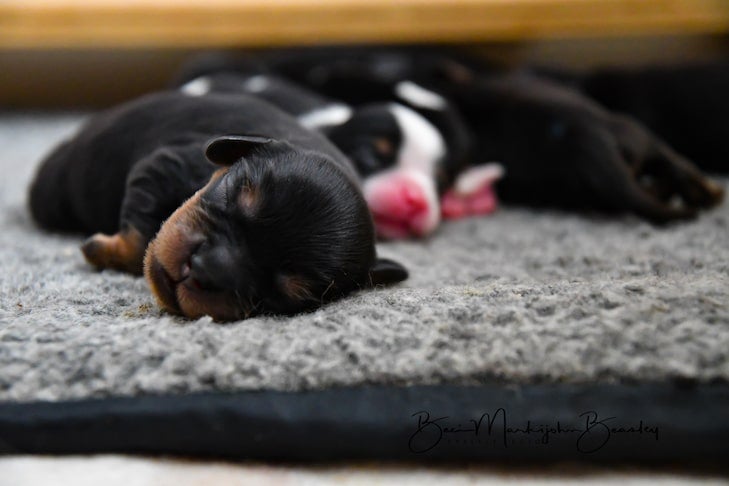
Coronavirus concerns did not dominate headlines when Beci Beasley boarded a plane for Canada in late January. Traveling with the North Carolina resident was her cherished Cavalier King Charles Spaniel, Sunny, who had a long-awaited date with a carefully selected stud dog.
“I had been waiting two years to do this breeding,” Beasley said. “There has been a lot of planning and research to make this happen.”
On March 25, Sunny delivered six beautiful puppies into a world that had been transformed in the nine weeks since the litter was conceived. Breeders now face questions of how to socialize and place puppies while keeping themselves and potential buyers safe from COVID-19.

“This is very nervewracking,” Beasley said. “Socialization is terrifying. With my last litter, I had 15 to 20 different friends visiting on different nights, so the puppies were exposed to people outside the household. Today, you don’t want anyone coming to your home. So how do you make sure your pups get the experiences they need?”
The health crisis has not diminished the desire for puppies. With a majority of Americans working from home, many families decided it is an opportune time to obtain a new dog. The AKC Marketplace has experienced record-breaking visits in recent weeks as the puppy-seeking public searches for available litters.
Coronavirus Concerns for Breeders
“I don’t think this is a case of not breeding, but changing the way we normally do things,” said AKC Breeder Field Representative Vanessa Skou.
Skou, who is also a breeder, had a litter of puppies ready to go to their homes last week. Typically, the families would come into her house, complete the paperwork, and then take their puppy. This time, she modified the routine to minimize contact. Paperwork was completed online so there was only a final contract to sign when the new owners arrived. She asked them to bring their own pen to sign the document.
“Usually, I carry the puppy out and put it in their crate in their car,” Skou said. “But this time, I had the family meet me outside. I placed the puppy down so they could pick him up, then I opened the gate so they could carry the puppy to their car. I also did not have them meet the mother and the rest of the litter.”
Breeders can still interact with puppy buyers if they use common sense and practical safety measures, according to Dr. Fred Askin, a pathologist at the University of North Carolina Medical Center, as well as an AKC Judge and breeder of West Highland White Terriers.
“People do not need to walk through your home,” Dr. Askin said. “I suggest having a room or area with outside access where visitors can maintain distance while they meet you and see the puppies. It should be an area that is easy to clean and disinfect. Before anyone comes over, ask them if they have had a fever or any other symptoms associated with COVID-19 or if they have been exposed to it.”
Require that everyone uses hand sanitizer or washes hands with soap and water before and after visiting the puppy area. Limit the number of visitors to one or two at a time. Families should leave children and grandparents at home. If you do allow the visitors to touch the puppies, it is a good idea to wipe down the pups with canine disinfecting wipes afterward.
Breeders Getting Creative Around COVID-19
Thankfully, technology makes it possible for breeders to interact with and interview potential puppy buyers without ever being face-to-face. Beasley has a video camera on her puppies 24/7 that she can take videos from or invite guests to view. As for paperwork and registrations, many can be achieved online, and even payment may be made online via PayPal, Venmo, or other programs.
“As far as vetting buyers, I plan to use all the technology tools available to me, like Facetime and teleconferencing,” Beasley said. “That way, I can see them and talk to them, and see their body language. If someone wants to see where the puppies were raised, we can do a virtual tour of my house. If someone wants to meet my puppies ahead of time, I don’t want people coming into my house. So we plan to find a local park and set up a couple of ex-pens with canvas covering the ground. We can bring a pop-up tent and a baby pool if the day is warm. The people can be on one side of the pen and us on the other, so we are not close.”
Early socialization is a tougher puzzle to solve as having visitors to your home and taking puppies on field trips (once they have vaccines) is risky these days.
“Even seeing another person is a good experience for a puppy so they can be socialized that way,” Beasley said. “We live near a park, so we plan to carry them or put them in a stroller and roll them around the park. We can stop and point out novel people to them, plus strollers and other things that they don’t see at home. You can also take them to dog-friendly businesses that are still open and carry them through the stores, maintaining distance from shoppers.”
Dressing up in different hats, wigs, and costumes is another way to bring “new” people into your puppies’ lives without bringing in strangers, she said.
Even when this crisis ends and the world returns to normalcy, these practices may continue for breeders, Skou said.
“This might be our new norm. Perhaps we do not want strangers in our homes any longer, and this is how we practice good safety and health precautions for our canines and families.”
Suggested Social Distancing for Breeders
- Make appointments to see a puppy, and limit the number of puppies shown.
- Explain that the buyers’ health and safety are as important as the health and well-being of your family, dogs, and puppies.
- Discuss what the customer should expect during the visit.
- Ask the client if they or anyone in their family has had a cold, flu or allergy symptoms or been exposed to, contacted, or overcame COVID- 19.
- Inquire if anyone has recently traveled by air or left the country, or if anyone works in the medical field.
- Ask that young, older, and compromised persons do not come to the appointment. Limit the number of visitors to two at a time.
- Limit contact with the customers. Do not shake hands and disinfect all touchpoints.
- Wash hands often with warm water and soap. Use plenty of hand sanitizer, if available, as well as keeping the proper social distance of at least 6 feet.
- Consider doing all transactions outside. Do not restrict yourself to small confined spaces.
- Ask puppy buyers to remove shoes or do a shoe bath. Ask them to put on rubber gloves to reduce touch points – if you can obtain gloves.
- Do not hand the puppy to the customer. This will put you too close to the customer. Set the puppy on the ground or floor and step away.
- Discourage face-to-face contact with the puppies.
- If you do paperwork with your customers, give them a pen which they can keep.
- Keep the time spent with customers to an absolute minimum.
- If the customer does not take the puppy, immediately bathe the puppy or clean with canine disinfecting wipes.
- Consider printing and posting a physical copy of these guidelines in and around your home and/or kennel.



